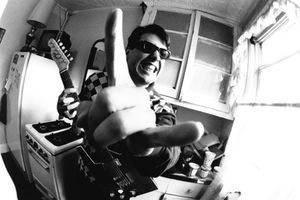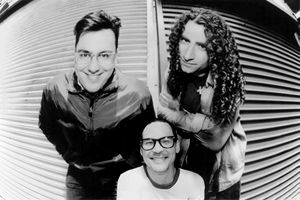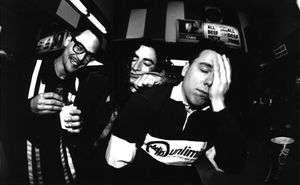Mono Puff
Mono Puff is an alternative rock band formed by John Flansburgh, Hal Cragin, and Steve Calhoon. The band has released two albums, 1996's Unsupervised, and 1998's It's Fun To Steal. While the band was only active from 1995 until 1998, they have never officially disbanded. The group was a side project for Flansburgh, away from They Might Be Giants, and is notable for its varying musical styles and emphasis on collaboration.
Contents
History[edit]
Formation and Unsupervised (1995-1996)[edit]

John Flansburgh released his first solo EP, John Flansburgh's Mono Puff, in March 1995 through the Hello Recording Club. The EP was recorded at Hello Studio, Flansburgh's home studio in Brooklyn. He created the EP almost entirely himself, though it included contributions from a few guest musicians. On October 7, 1995, the Hello Recording Club hosted a showcase event featuring artists that had released work through the club. Flansburgh decided to form a band for this show. A later press release detailed the event:
In 1995, Flansburgh mounted a showcase for Hello artists and put together a one-off Mono Puff line-up with drummer Steve Calhoon of Skeleton Key, Hal Cragin of Iggy Pop's band and Mike Viola of the Candy Butchers. That spectacular gig led to a record deal and the release of Unsupervised, in between TMBG projects, a year later.
Flansburgh explained in a 1996 interview: "I had a bunch of songs that I had put out through the club that I had wanted to record in a more full-blown way. I got together a band to do the songs at a "Hello" showcase in NY, and recorded the bulk of the record [Unsupervised] a couple of weeks later." Viola recalled forming the band with Flansburgh in a 2011 interview: "It was me and John who started the thing. [...] He brought [Cragin and Calhoon] on board, and they were amazing."
Flansburgh explained where the name "Mono Puff" came from in a 1996 interview: "The name comes from an experience I had at the John Coltrane Church in San Francisco. There was a little girl there with a single puff of hair in a perfect circle on top of her head, and I thought it would be called a Mono Puff." Flansburgh has also mentioned soul performer Betty Wright as an inspiration for the name, "who had one monolithic puff afro above her head."[1] Mono Puff often covered her song "Girls Can't Do What The Guys Do" at live shows.
The group's first full-length album, Unsupervised, released in June 1996 on the independent record label Rykodisc. The album included re-recordings of the earlier EP's songs, as well as new material. The majority of the album was recorded over one weekend in October 1995, and was mixed a week later. It was produced by Pat Dillett. The album featured the core band lineup of Flansburgh (guitar, vocals), Calhoon (bass) and Cragin (drums). Mike Viola was only credited as an additional musician, rather than a core member, as his record contract had a strict exclusivity clause.[2] A number of other guest artists are credited on the album. Flansburgh later stated: "My original intention was to get back to more electronic stuff with [Mono Puff], and then it turned into this twin-guitar thing with Mike Viola."[3]
The album spawned one single, "The Devil Went Down To Newport", for which a music video was produced. The song was released as a 7" single and as a CD extended play, which included two non-LP tracks and a slow, funky remake of the song. The band supported the release of the album with a week-long East Coast tour in June 1996,[4] which included an appearance on NPR's All Things Considered. Hal Cragin was busy working with Iggy Pop and couldn't make the tour. He was replaced on bass by Dan Levine.[5] Guitarist Eric Schermerhorn, then a member of They Might Be Giants' band, also joined the band for this tour. To promote the band, Flansburgh started a Mono Puff message board on AOL's SpinOnline forum, in which he wrote a tour diary and answered fan-submitted questions. A national tour was planned for September 1996, but for unknown reasons it didn't transpire.
Flansburgh described his intentions for the Mono Puff project in a June 1996 interview:
Usually people do side projects when they're really dissatisfied with what they're doing in their primary thing, and that's hardly the case. I had a bunch of extra songs, and I was interested in doing things on a different scale. In an established band, you're not paranoid if you think people are watching you. Critics track your career, and people compare your current efforts to your previous efforts. One of the nice things about a side project like Mono Puff is it cleans the slate. It's relatively free of associations. I can do a lot of different kinds of stuff.
Expansion and It's Fun To Steal (1997-1998)[edit]
Mono Puff played a few more shows in 1996, after which they took a year-long break from live performances. The band returned in September 1997. They played sporadic shows in small clubs around New York, in the breaks between They Might Be Giants tours. The band's lineup expanded beyond the core trio, as more performers joined the band for these shows. Flansburgh: "Playing in New York, we keep the line-up loose, take advantage of all the great talent that's out there."[6] This expanded version of the band was often referred to as the Mono Puff Syndicate. By 1998, the core members of the group were Flansburgh, Calhoon and Cragin, with Joe McGinty on keyboards, Phil Hernandez (as DJ ***** Spicy) on percussion and samples, and Robin Goldwasser (as Sister Puff) on vocals.
Mono Puff recorded two EPs for the Hello Recording Club in 1997 — The Hal Cragin Years and The Steve Calhoon Years. These were later combined with new material to create their second album, It's Fun To Steal, released in May 1998 on Bar/None Records. The album saw an evolution in the band's sound from the guitar-heavy alternative rock of their earlier work, to a more wide-ranging, genre-blending style that featured an emphasis on R&B and funk music. Flansburgh commented on the album's direction in a 1998 interview:
It's very much a groove-oriented record. For my entire life, I've been a big radio listener, and I've always been into soul music and R&B stuff. [...] It's a little less lyric-driven and a little bit more relaxed than a lot of the Giants stuff. This record, we really went to great lengths to try to create something that held together as one thing. It holds on to a vibe for the whole record.
The band played frequent live shows throughout 1998, including a short tour in August to support It's Fun To Steal. Their final show was on November 7, 1998, after which Hal Cragin moved to California. Though the band has not released new music since 1998, Flansburgh has stated that they have "been on a long hiatus."[7] He has cited various obligations and geographic distance as barriers to bringing the band back. He stated in 2012: "The notion of reviving Mono Puff is always enticing since everyone involved are such dear pals of mine and it's a very jolly set up, but everyone is very busy and living in different places now so it's harder than ever to think about it really happening."[8] In mid-2020, it was announced that Mono Puff would release an EP in 2021 to be initially distributed via the They Might Be Giants Instant Fan Club, their first new release in over two decades. It was mentioned a few times after the announcement,[9] [10] but the direction of the project changed, and Flansburgh decided against releasing it under the Mono Puff name: "it's as much a set of sketches, demos and experiments and doesn't spotlight any other musicians."[11]
Discography[edit]
- John Flansburgh's Mono Puff - 1995 (EP)
- Unsupervised - 1996 (LP)
- The Devil Went Down To Newport - 1996 (EP, CD and 7")
- The Hal Cragin Years - 1997 (EP)
- The Steve Calhoon Years - 1997 (EP)
- It's Fun To Steal LP Sampler - 1997 (Cassette)
- It's Fun To Steal - 1998 (LP)
Members[edit]
Mono Puff has featured a shifting line-up over the years, but Flansburgh, Calhoon, and Cragin have appeared on every Mono Puff release, with the exception of the initial Flansburgh solo EP. The other "core members" listed were major players on either of Mono Puff's full-length albums. The "guest artists" are musicians that either performed with the group live, or are credited on studio recordings.
Core members[edit]
- John Flansburgh - acoustic and electric guitar, Casio synthesizer, Mellotron, Novostation synthesizer, Oberheim synthesizers, organ, piano, production, programming, samples, vocals
- Hal Cragin - bass, electric piano, guitar, Hammond organ, percussion, programming, synthesizers
- Steve Calhoon - drums
- Mike Viola - guitars, Hammond organ, vocals (on Unsupervised)
- Phil Hernandez (as DJ ***** Spicy) - bongos, scratching, timbales (on It's Fun To Steal)
- Joe McGinty - clavinet, Oberheim synthesizers, organ, piano, synth strings (on It's Fun To Steal)
- Robin Goldwasser (as Sister Puff) - vocals, vocal arrangement (on It's Fun To Steal)
Guest artists[edit]
- Ammonia D - Mellotron samples on "Careless Santa" and "To Serve Mankind"
- Mary Birdsong (as Sugar Puff) - vocals
- Barry Carl - vocals on "Night Security"
- Rob Cournoyer - drums on "I Just Found Out What Everybody Knows"
- Double Dong (Plen-T Pak and Ghost Krabb) - beat boxing on "Extra Krispy"
- Mark Feldman - violin on "Dashiki Lover" and "Night Security"
- Kate Flannery (as Lady Puff) - vocals
- Yuval Gabay - drum loop on "Careless Santa"
- Dan Levine - trombones
- Frank London - trumpets
- Elina Löwensohn - voice-over on "Distant Antenna"
- Nancy Lynn Howell - vocals on "Don't I Have The Right?"
- Dan Miller - guitar
- Jim O'Connor - trumpet on "Unsupervised"
- Mauro Refosco - bongos, congas, cowbell on "It's Fun To Steal (Song)" and "Creepy"
- Erik Sanko - bass
- Eric Schermerhorn - guitar
- Jay Sherman-Godfrey - guitar, vocals
External links[edit]
- Press release from Bar/None Records
- Rykodisc website for Unsupervised
- MonoPuff.org fan site

